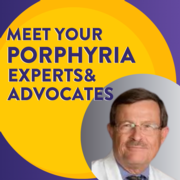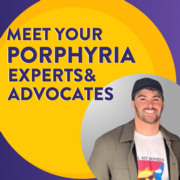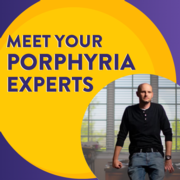The United Porphyrias Association is proud to work closely with the porphyria experts on the UPA's Scientific Advisory Board and at the Porphyrias Consortium.
We're pleased to introduce our Experts in Action where we'll feature:
Sign up to never miss a feature!

"Everything you learn about the disease you learn from patients. It’s important to understand how the disease really affects people, how the treatments benefit people, and for that you really need to listen to your patients."

"A porphyria diagnosis creates a space between you and the life you were living before... it can feel isolating and lonely."

"I realized that my condition with the sun was either going to define my life or become a cool addition to the story of my life."

"I want to turn what I went through into something good, because otherwise it’s just suffering for the sake of suffering, and I can’t accept that. I want to do something more with my story."

"Building that connection with your elected officials can help sensitize them to that reality and keep them engaged in rare disease issues."

"Collaboration between patients, caregivers, advocates, expert physicians, industry partners and regulators is necessary to realize advancements in porphyria. All of us doing our important roles can lead to better diagnostics, new therapies and better quality of life for our patient community."

"With rare diseases, you could call every patient a clinical trial of one because each one is unique. It is important to listen to them and try to address their symptoms."

"You have to figure it out for your own body and trust that you know your body better than anybody else. I think that's where having a community of other patients and patient advocates is important because it can give you that confidence, security, friendship, and empathy that you're doing what's right for you."

"It’s been really eye-opening to see how important patient involvement is in rare disease. Patients can drive the field, move the field. Rare diseases like porphyria are very life-altering. Patients have an important role in how the regulatory agencies and how physicians are looking at the disease and what the outcomes are."

"My connection to porphyria is a bit more personal than a lot of other researchers. I have EPP porphyria."